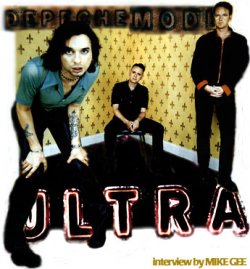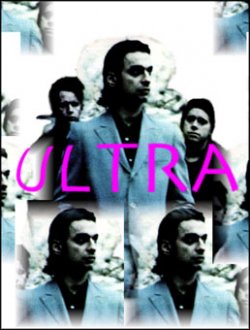- Joined
- Aug 15, 2019
- Messages
- 7,493
- Reaction score
- 143
- Points
- 63
Feature (iZine - Reverberation Interviews, 1997)
Interview with DM on the iZINE magazine. april 1997.

Dave Gahan, Martin Gore and Andy Fletcher went looking for a personal Jesus and only found the devil inside. In seeking salvation they teetered on the lip of destruction, toppled into addiction. Depeche Mode, the band who took it too close to the edge on their 14 month, 156-date, "Songs Of Faith And Devotion" tour that spanned 1993/94. Depeche Mode, the band that nearly cracked up for good.
How devastating that tour was, still is to them, comes in a single sentence lead singer and rehabilitated alcoholic and drug addict Dave Gahan whispers as they talk about touring and their decision not to take their new set "Ultra" on the road: "Touring," he says, "it's a really scary thought."
That Depeche Mode have a new album at all is a triumph for belief and fortitude over sheer emotional exhaustion, sustained physical and mental abuse. In many ways it is one of the more remarkable comebacks in the excess-littered annals of popular music.
Gathered in a London studio a few weeks before the release of "Ultra", Gahan, Andy Fletcher and songwriter Martin Gore - the core trio - seem glad to talk, almost to release the tension of the silence that's enveloped the spectre of Depeche Mode since Gahan's well-documented drug problems, long-time member Alan Wilder's May '95 departure and the countless stories of intense internal friction that surfaced during and after that twilight zone trek.
Somehow, 17 years down the track, and out of this commando course in rock'n'roll survival, they've fashioned a telling, moving and beautifully-crafted album that not only ignores the troubled past, but steers - to some degree - away from Gore's religious obsession and remorseless search for redemption that dominated "Songs" and much of their previous output.
Not that Gore isn't the serious soul-searcher. That will never change. Despite a noticeable sound shift on "Ultra" that sees the Mode move into an undulating road of sound that takes truckstops in a everything from rock and big pop ballads to steel-guitar cut badlands Americana and fundamentally vibey dance, they still embrace those spartan jazz grabs cut through drifted wastelands that echo 'Songs'" more twisted, shattered atmospheres.
Depeche Mode may have scared themselves but they haven't run away. Only this time they aren't digging so dark. As they talk there's an almost audible mending going on. Whether it's ever completed only time will tell. They have so much to come to terms with.
Time has already done some of the work but it is left unsaid that there is much to still do. Still they talk freely about that tour and its after effects.
"After being on top of each other for three years there was a thing of being in the room with each other was a bit tense. We've never got to actually fighting, yet," Fletcher says.
"We did manage to carry that off for 14 months," Gore continues. "It was just that at some points separate limos were necessary."
Gahan interjects, "We didn't get to separate hotels, but I think it was on the cards. It did get to separate floors though. We were separate everything: separate security; separate rooms. The room we were together in was onstage and we functioned together well on stage. We all had our roles and knew what we were doing. That was the most comfortable place. The thing you have to remember is that it's not just us. There are 100 people working with us and it's everybody: everybody's emotions all wrapped up together and sometimes there's going to be conflict."
"I think we learned a lot from that though," Fletcher says. "I think we took too much on and hopefully now we've learned our lessons."
Gahan laughs, dryly, as he remembers the excesses, "I think there were four separate parties going on every night."
Gore carries on, "It started off as separate floors and then we realised you could still be above or below somebody, so we had to be on separate floors at like opposite ends so it ended up in a zig zag pattern.
"To be honest it was total relief to get home at the end of it. It got especially bad with about two or three weeks to go but you felt I've got (some quote missing), made it, this far, it would be really sad to die at this stage."
As it was he nearly did: "I was actually going on holiday, in the same plane as Alan Wilder - the one who left- and we were on our way from Dallas to San Juan. It was a big American Airlines plane and it just started making an horrific noise and tilting totally sideways and plummeting to the ground. The stewardesses were trying to run around but it was difficult running around at that angle [much laughter] telling everyone not to panic. And they looked really panicked themselves. I remember that I thought we were actually dead. It took the pilot about 10 minutes to make an announcement that we had a pressurisation problem."
Gahan comments dryly that the odds had already increased considerably by that stage that something airborne would happen, pointing out that if you spend some part of nearly every day in a plane for 15 months then chances are - you're looking down the "Barrel Of A Gun". At least, that's one possible interpretation for the crunchy, barnstorming, rock - yes, rock, and even the band who hate the word will now use it - single from "Ultra".
Interview with DM on the iZINE magazine. april 1997.

Dave Gahan, Martin Gore and Andy Fletcher went looking for a personal Jesus and only found the devil inside. In seeking salvation they teetered on the lip of destruction, toppled into addiction. Depeche Mode, the band who took it too close to the edge on their 14 month, 156-date, "Songs Of Faith And Devotion" tour that spanned 1993/94. Depeche Mode, the band that nearly cracked up for good.
How devastating that tour was, still is to them, comes in a single sentence lead singer and rehabilitated alcoholic and drug addict Dave Gahan whispers as they talk about touring and their decision not to take their new set "Ultra" on the road: "Touring," he says, "it's a really scary thought."
That Depeche Mode have a new album at all is a triumph for belief and fortitude over sheer emotional exhaustion, sustained physical and mental abuse. In many ways it is one of the more remarkable comebacks in the excess-littered annals of popular music.
Gathered in a London studio a few weeks before the release of "Ultra", Gahan, Andy Fletcher and songwriter Martin Gore - the core trio - seem glad to talk, almost to release the tension of the silence that's enveloped the spectre of Depeche Mode since Gahan's well-documented drug problems, long-time member Alan Wilder's May '95 departure and the countless stories of intense internal friction that surfaced during and after that twilight zone trek.
Somehow, 17 years down the track, and out of this commando course in rock'n'roll survival, they've fashioned a telling, moving and beautifully-crafted album that not only ignores the troubled past, but steers - to some degree - away from Gore's religious obsession and remorseless search for redemption that dominated "Songs" and much of their previous output.
Not that Gore isn't the serious soul-searcher. That will never change. Despite a noticeable sound shift on "Ultra" that sees the Mode move into an undulating road of sound that takes truckstops in a everything from rock and big pop ballads to steel-guitar cut badlands Americana and fundamentally vibey dance, they still embrace those spartan jazz grabs cut through drifted wastelands that echo 'Songs'" more twisted, shattered atmospheres.
Depeche Mode may have scared themselves but they haven't run away. Only this time they aren't digging so dark. As they talk there's an almost audible mending going on. Whether it's ever completed only time will tell. They have so much to come to terms with.
Time has already done some of the work but it is left unsaid that there is much to still do. Still they talk freely about that tour and its after effects.
"After being on top of each other for three years there was a thing of being in the room with each other was a bit tense. We've never got to actually fighting, yet," Fletcher says.
"We did manage to carry that off for 14 months," Gore continues. "It was just that at some points separate limos were necessary."
Gahan interjects, "We didn't get to separate hotels, but I think it was on the cards. It did get to separate floors though. We were separate everything: separate security; separate rooms. The room we were together in was onstage and we functioned together well on stage. We all had our roles and knew what we were doing. That was the most comfortable place. The thing you have to remember is that it's not just us. There are 100 people working with us and it's everybody: everybody's emotions all wrapped up together and sometimes there's going to be conflict."
"I think we learned a lot from that though," Fletcher says. "I think we took too much on and hopefully now we've learned our lessons."
Gahan laughs, dryly, as he remembers the excesses, "I think there were four separate parties going on every night."
Gore carries on, "It started off as separate floors and then we realised you could still be above or below somebody, so we had to be on separate floors at like opposite ends so it ended up in a zig zag pattern.
"To be honest it was total relief to get home at the end of it. It got especially bad with about two or three weeks to go but you felt I've got (some quote missing), made it, this far, it would be really sad to die at this stage."
As it was he nearly did: "I was actually going on holiday, in the same plane as Alan Wilder - the one who left- and we were on our way from Dallas to San Juan. It was a big American Airlines plane and it just started making an horrific noise and tilting totally sideways and plummeting to the ground. The stewardesses were trying to run around but it was difficult running around at that angle [much laughter] telling everyone not to panic. And they looked really panicked themselves. I remember that I thought we were actually dead. It took the pilot about 10 minutes to make an announcement that we had a pressurisation problem."
Gahan comments dryly that the odds had already increased considerably by that stage that something airborne would happen, pointing out that if you spend some part of nearly every day in a plane for 15 months then chances are - you're looking down the "Barrel Of A Gun". At least, that's one possible interpretation for the crunchy, barnstorming, rock - yes, rock, and even the band who hate the word will now use it - single from "Ultra".

